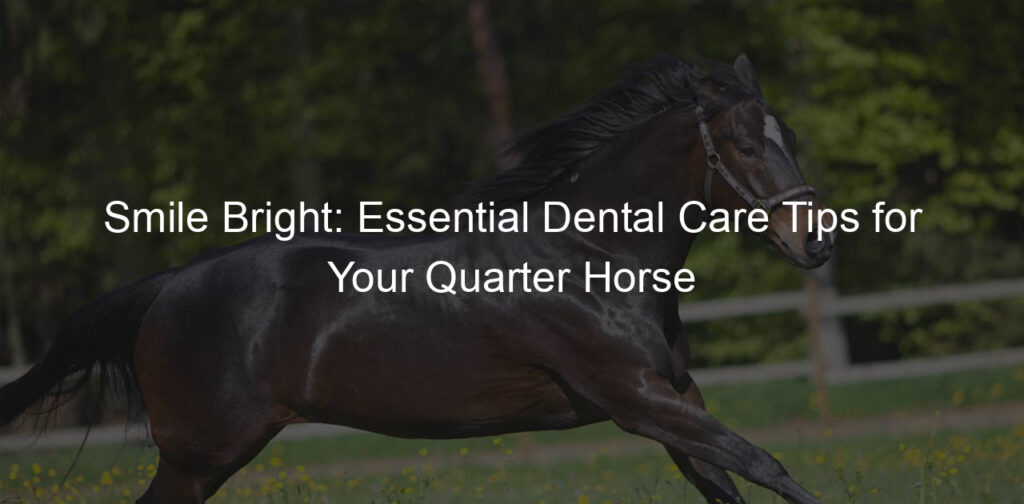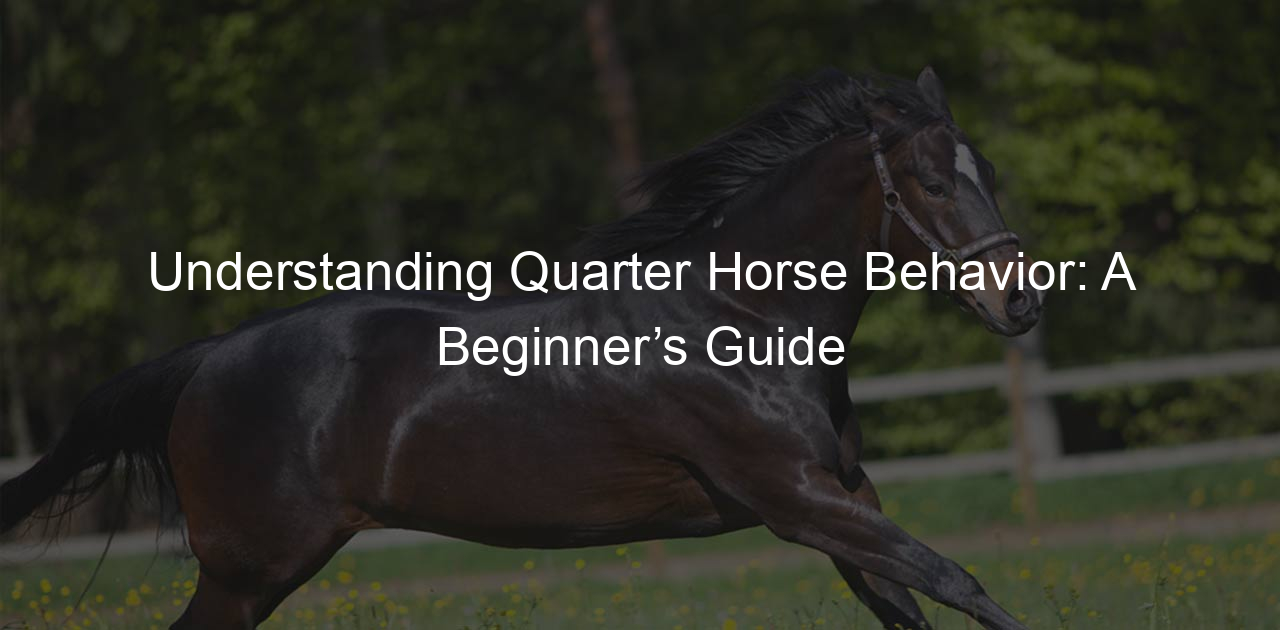Introduction to Quarter Horse Dental Health
Hey there horse lovers! Today we’re going to dive into a topic that’s super important but often overlooked – the dental health of Quarter Horses. Just like us humans, horses need their teeth to be in tip-top shape for overall health and happiness. So, let’s get started!
- Importance of dental health in Quarter Horses
- Common dental issues in Quarter Horses
First off, why is dental health so important for Quarter Horses? Well, good dental health is key for a horse’s overall well-being. A horse with poor dental health can have trouble eating, which can lead to weight loss and other health problems. Plus, dental issues can cause pain and discomfort, which can affect a horse’s behavior and performance. So, taking care of your horse’s teeth is a big deal!
Now, let’s talk about some common dental issues in Quarter Horses. One common issue is sharp edges forming on the teeth, which can cut the horse’s mouth and make eating painful. Another common problem is retained baby teeth, which can cause discomfort and make it hard for the horse to chew. There’s also tooth decay, which can lead to serious health problems if not treated. So, it’s really important to keep an eye on your horse’s dental health and get any issues checked out by a vet.
So, that’s a quick intro to Quarter Horse dental health. Keep reading to learn more about equine dentistry, essential horse dental care practices, and some case studies on successful dental care in Quarter Horses. And remember, a happy horse is a healthy horse!
Understanding Equine Dentistry
Let’s dive into the fascinating world of equine dentistry! This is all about taking care of horse teeth, which is super important for our Quarter Horses. We’ll start by exploring the basic anatomy of horse teeth and then see how horse dental care is different from human dental care.
-
Basic Anatomy of Horse Teeth
Did you know that horses have between 36 and 44 teeth? That’s a lot more than us humans who have only 32! Horse teeth are divided into two types: incisors at the front for biting and cheek teeth at the back for grinding food. Unlike human teeth, horse teeth keep growing throughout their life. This is because horses eat a lot of grass, which wears down their teeth over time. So, their teeth need to keep growing to make up for this wear and tear. Cool, right?
-
How Horse Dental Care Differs from Human Dental Care
Now, horse dental care is quite different from human dental care. For starters, horses don’t brush their teeth twice a day like we do! Instead, their dental care is mostly about making sure their teeth are wearing down evenly. This is done through regular dental check-ups and sometimes ‘floating’. Floating is a process where a vet files down any sharp edges on a horse’s teeth. It’s like a manicure, but for horse teeth!
Another big difference is that while we humans go to a dentist for our teeth, horses go to an equine dentist. These are vets who specialize in horse teeth. They use special tools and techniques to take care of horse teeth, which are a lot bigger and tougher than human teeth. So, while we might use a toothbrush and toothpaste, equine dentists use things like dental mirrors, floats, and power tools. It’s a whole different ball game!
So, that’s a quick look at equine dentistry. It’s a fascinating field that plays a huge role in keeping our Quarter Horses healthy and happy. In the next section, we’ll talk about some essential horse dental care practices that every horse owner should know about.
Essential Horse Dental Care Practices
Just like humans, horses need regular dental care to stay healthy and happy. In this section, we’ll talk about some of the most important practices to keep your Quarter Horse’s teeth in tip-top shape.
Maintaining Horse Dental Health
There are two main ways to maintain your horse’s dental health: regular check-ups and proper feeding practices. Let’s dive into these a bit more.
- Regular dental check-ups for Quarter Horses
- Proper feeding practices for dental health
Regular dental check-ups are crucial for your Quarter Horse’s health. A professional equine dentist should examine your horse’s teeth at least once a year. These check-ups can help identify any dental issues early, before they become serious problems. During a check-up, the dentist will look for signs of tooth decay, gum disease, and other dental problems. They may also perform a teeth cleaning to remove any built-up plaque or tartar.
The food your horse eats plays a big role in their dental health. Horses are designed to graze on grass, which naturally helps clean their teeth. If your horse eats a lot of grain or other processed foods, they may be more likely to develop dental problems. To help keep your horse’s teeth healthy, try to provide plenty of fresh grass or hay for them to graze on. Also, avoid feeding your horse too many sugary treats, as these can lead to tooth decay.
Remember, maintaining your horse’s dental health is a team effort. You, your horse, and your equine dentist all play a role. By following these essential dental care practices, you can help ensure your Quarter Horse has a healthy, happy smile for years to come.
Equine Dental Care Practices
Hey there, horse lovers! Let’s dive into some practical tips for taking care of your Quarter Horse’s teeth. It’s easier than you might think!
- How to perform a basic dental check-up at home
First things first, you don’t need to be a dentist to do a basic check-up on your horse’s teeth. Here’s a simple step-by-step guide:
- Step 1: Make sure your horse is calm and comfortable. This will make the process easier for both of you.
- Step 2: Gently open your horse’s mouth. You might need a flashlight to see clearly.
- Step 3: Look for any signs of discomfort, like redness, swelling, or bleeding. Also, check for any broken or loose teeth.
- Step 4: Feel the horse’s teeth. They should be smooth and even. If you feel any sharp edges, it might be time for a professional check-up.
Remember, this is just a basic check-up. It doesn’t replace a professional dental exam!
- When to call a professional equine dentist
While home check-ups are great, there are times when you need to call in the pros. Here are some signs that it’s time to schedule a visit with a professional equine dentist:
- Your horse is showing signs of discomfort or pain when eating.
- You notice a change in your horse’s eating habits, like dropping food or eating slowly.
- Your horse has bad breath or a foul smell coming from the mouth.
- You see any abnormal discharge or bleeding from the mouth.
- Your horse is losing weight for no apparent reason.
If you notice any of these signs, don’t wait. Call a professional equine dentist right away. Remember, early detection can prevent serious dental problems!
And that’s it, folks! With these tips, you can help keep your Quarter Horse’s teeth healthy and strong. Happy brushing!
Dental Issues in Quarter Horses
Just like us humans, our equine friends can also suffer from dental problems. In this section, we’ll talk about some common dental issues that Quarter Horses often face and how these issues can impact their overall health and performance.
- Common dental problems and their symptoms
- Sharp edges: Over time, a horse’s teeth can develop sharp edges that can cause discomfort and even injury to the mouth. Symptoms may include difficulty eating, weight loss, and behavioral changes.
- Loose or broken teeth: Just like in humans, horses can also have loose or broken teeth. This can cause pain and difficulty eating. You might notice your horse dropping food or showing signs of discomfort while chewing.
- Periodontal disease: This is a condition where the gums and bone that support the teeth become inflamed or infected. Symptoms can include bad breath, bleeding gums, and loose teeth.
- How dental issues can affect a horse’s overall health and performance
Quarter Horses, like all horses, can experience a variety of dental problems. Some of the most common include:
Dental problems in horses can have a significant impact on their overall health and performance. A horse with dental issues may have trouble eating, which can lead to weight loss and poor nutrition. This can weaken the horse and make it less able to perform at its best.
Moreover, dental issues can cause pain and discomfort, which can affect the horse’s behavior and mood. A horse with dental pain may be less willing to work, may show signs of aggression, or may become depressed.
Finally, dental problems can lead to other health issues. For example, a horse with periodontal disease may be at risk of developing heart, kidney, or liver disease if the infection spreads.
In conclusion, it’s crucial to keep an eye on your Quarter Horse’s dental health. Regular check-ups with a vet can help detect and treat dental problems early, before they can affect your horse’s health and performance.
Quarter Horse Oral Hygiene
Keeping your Quarter Horse’s mouth clean isn’t just about making sure they have a pretty smile. It’s about their overall health and happiness. Let’s dive into some tips and tricks on how to keep your horse’s mouth in tip-top shape!
Dental Care Tips for Quarter Horses
Just like us humans, horses need regular dental care too. Here are some easy-to-follow tips to help you keep your Quarter Horse’s teeth healthy and strong:
- Brushing techniques for horse teeth
- Products for maintaining horse oral hygiene
Brushing your horse’s teeth might sound a bit strange, but it’s actually a great way to keep their mouth healthy. You don’t need a special horse toothbrush – a soft human toothbrush will do just fine. Just make sure to brush gently and reach all the corners of their mouth. Remember, always brush from the gum line towards the tip of the tooth to remove any food particles and prevent plaque buildup.
There are many products available in the market that can help maintain your horse’s oral hygiene. Some of these include horse toothpaste, dental rinses, and even special horse dental chews. These products can help prevent plaque buildup, fight bad breath, and promote overall oral health. Just make sure to choose products that are specifically designed for horses.
Remember, good oral hygiene is not just about brushing and using the right products. It also involves regular check-ups with a vet or an equine dentist. They can spot any potential issues early and provide the necessary treatment. So, let’s keep our Quarter Horses smiling!
Case Studies: Successful Dental Care in Quarter Horses
Let’s take a look at some real-life examples of Quarter Horses who’ve had successful dental care. These case studies will show you how important it is to keep your horse’s teeth healthy!
-
Case Study 1: Overcoming severe dental issues
Meet Thunder, a 7-year-old Quarter Horse who had severe dental issues. His owner noticed that he was losing weight and not eating properly. A visit to the vet revealed that Thunder had sharp points on his teeth that were causing him pain.
Thunder’s vet performed a procedure called floating, which is a way to file down the sharp edges of a horse’s teeth. After a few weeks of recovery, Thunder was back to his old self, eating properly and gaining weight. This case shows how important regular dental check-ups are for your horse’s health.
-
Case Study 2: Maintaining dental health in older Quarter Horses
Next, let’s talk about Daisy, a 15-year-old Quarter Horse. As Daisy got older, her teeth started to show signs of wear and tear. Her owner made sure to schedule regular dental check-ups to monitor her dental health.
Thanks to these regular check-ups, Daisy’s vet was able to catch and treat dental issues early. This helped Daisy maintain a healthy weight and stay comfortable in her old age. This case study shows that dental care is just as important for older horses as it is for younger ones.
These case studies highlight the importance of regular dental care for Quarter Horses of all ages. Remember, a healthy mouth is a key part of a healthy horse!
Conclusion: The Importance of Regular Equine Dental Care
As we’ve journeyed through the world of equine dentistry, we’ve learned a lot about how to keep our Quarter Horses’ teeth healthy. Let’s wrap up with some key takeaways and resources for further learning.
- Key takeaways for maintaining your Quarter Horse’s dental health
- Resources for further learning about equine dentistry
Remember, regular check-ups are essential. Your horse’s teeth should be examined at least once a year by a qualified equine dentist. This will help catch any potential issues early before they become major problems.
Don’t forget about the importance of a balanced diet. Horses need a mix of hard and soft foods to keep their teeth in good shape. And always provide plenty of fresh, clean water!
Finally, be on the lookout for signs of dental issues. If your horse is dropping food, losing weight, or showing signs of discomfort when eating, it’s time to call the vet.
If you’re interested in learning more about equine dentistry, there are plenty of resources out there. The Wikipedia page on Equine Dentistry is a great place to start. It provides a comprehensive overview of the topic, including the history of equine dentistry, common dental problems in horses, and more.
For more in-depth information, consider enrolling in an online course or attending a workshop. Many veterinary schools and equine associations offer educational programs on horse dental care.
Remember, your Quarter Horse’s dental health is a key part of their overall well-being. By taking the time to understand and implement proper dental care practices, you’re ensuring a happier, healthier life for your horse. Thanks for reading, and happy brushing!









